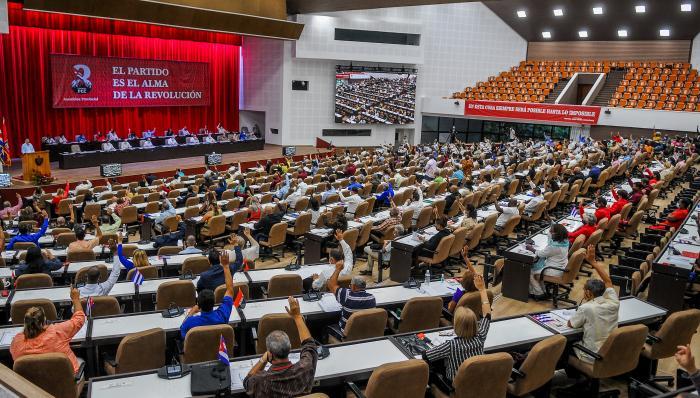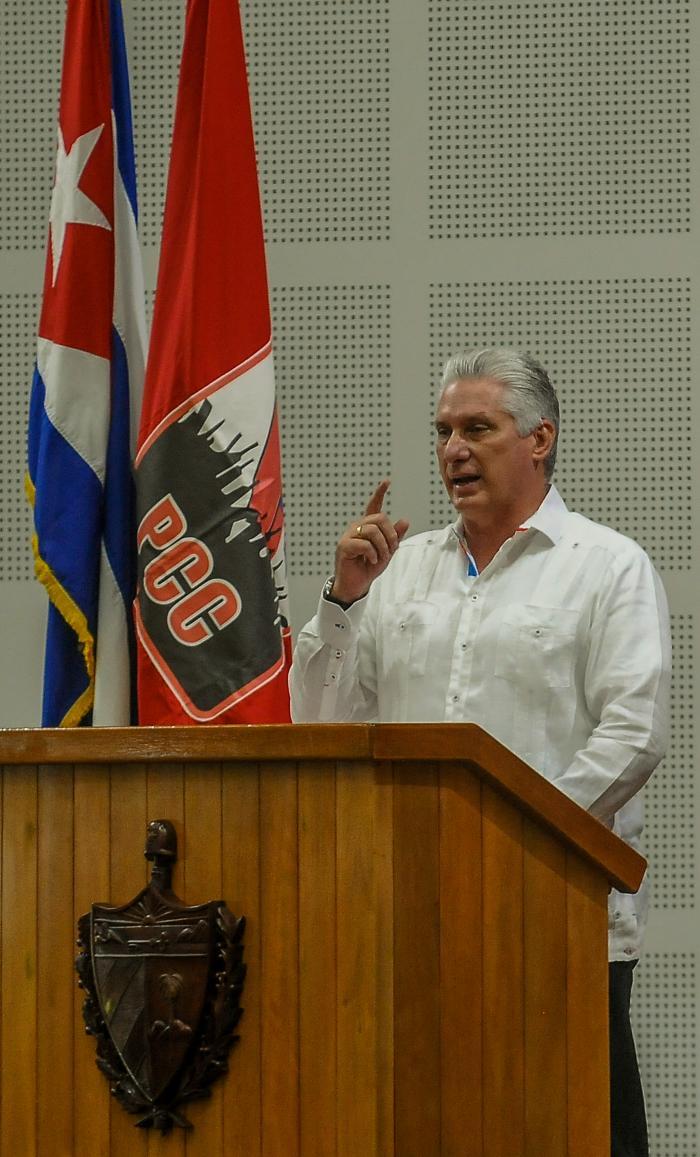
(Transcript: Presidency of the Republic)
Dear compañeras and compañeros, who have participated in this important Party accountability assembly in our country’s capital, representing the membership of the Communist Party in the capital:
Our first words are devoted to reiterating the congratulations and recognition of those elected as members of the Party Provincial Committee and its Provincial Bureau, of the cadres who devoted their lives, during these recent years, to the difficult and demanding Party work in this location and are now moving on to other important revolutionary activities, and, in particular, comrade Luis Torres Iríbar, reelected as First Secretary of the Party Provincial Committee, who has tirelessly united and mobilized forces to overcome difficult challenges, adversities and complex situations, promoting the revolutionary enthusiasm synthesized in the phrase we all share and defend: "For Havana, the greatest!"
With this Assembly, characterized by critical, honest, combative and committed debate, the accountability/review process at the provincial level, directed toward follow-up on the Eighth Party Congress, has concluded.
This process has contributed the following elements: First, we have observed that there is clarity and the concepts, ideas and directives which emerged from debate at the Eighth Party Congress, have been assimilated. These issues have been given follow-up, that is, we have not yet reached the provincial assemblies to begin implemention of the Eighth Congress agreements; on the contrary, after the Eighth Congress, after each province worked on its own particular strategies to implement the agreements of the Eighth Congress, follow-up has been given, and here today, we arrive with a mature debate in which we have begun to articulate these ideas, concepts, and directives, to become concrete, and which, above all, presents us with everything we must do now. The process also contributed to improving the composition of bureaus and municipal and provincial committees of the Party,in terms of skin color, sex, and age; and an adequate renovation of the staff.
The reports were made public in all provinces and were, therefore, also debated by our population - Morales gave me the figure of more than half a million people who, in one way or another, participated in debates about these reports - and it must be said that they were critical, objective, and realistic reports, which gave them a degree of credibility, since they included the principal problems that our population is facing in their daily lives, and which we must resolve via the Party.
There was a wide-ranging conversation with the membership and the population. The problems that most affect the population and the country were addressed and transcendental issues were discussed, including political-ideological work, the ideological battle, Party functioning, the economic battle, work in the neighborhoods and communities, youth and our cadre policy. It must be said that by working through these provincial assemblies after the Eighth Congress, we have given continuity to the Congress, and, simultaneously, while these provincial evaluation processes were being conducted, we were also involved in the members’ assemblies - some of you have referred to the development of these in your comments - which should lead us to the Party National Conference we will have next year. In other words, two years of Congress: In the first year we completed a cycle of Party provincial assemblies and membership assemblies; and in the second year following the Congress we will be conducting a whole series of internal evaluations of Party work at the national conference.
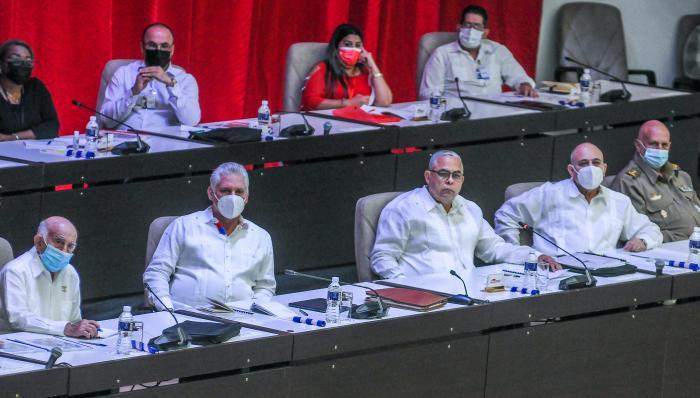
On the other hand, we must also consider as a continuition of the Eighth Congress the debates and contributions of the second and third plenums of the Central Committee of the Party, where you have seen that the topics that we discussed and brought here are topics which represent continuity of the Congress and the agreements made were specifically directed toward implementing the directives approved during the Congress.
We have been involved in a process – yet to be concluded - of analyzing enterprise structures and administrative positions at the company level, in order to strengthen enterprise management and leadership in our country. We just begun with all this, but getting the Congress agreements into effect requires many clarifications and actions that involve a large portion of our society.
It must be recognized that this process is being undertaken in a complicated context. The world today is experiencing a scenario of symbolic power disputes and a cultural/communicational war that U.S. imperialism has been promoting for years, today attacking many societies on the planet and leaving them defenseless. The impact of multilateral crisis over these last few years has been aggravated by the pandemic, the social alienation of individuals has increased, selfishness and the depoliticization of society are eclipsing solidarity and this favors ultra-conservative right wing projects. And you have seen how in the world the return to fascist ideas has also begun to manifest itself with certain new peculiarities.
If we were to describe this situation, we are obliged to address three fundamental elements: first, the intensified blockade. We are not talking about the blockade, we have always had the blockade, we have survived, we have resisted and we have advanced despite the implementation of the brutal blockade policy; but the blockade that we have experienced, especially in the last two years, is a blockade that was tightened with the application of 243 measures by the Trump administration, which the Biden administration has maintained unchanged, showing that, in the United States, the Democratic and Republican parties are one; they think the same way and defend, above all, a hegemonic strategy of imperial domination.
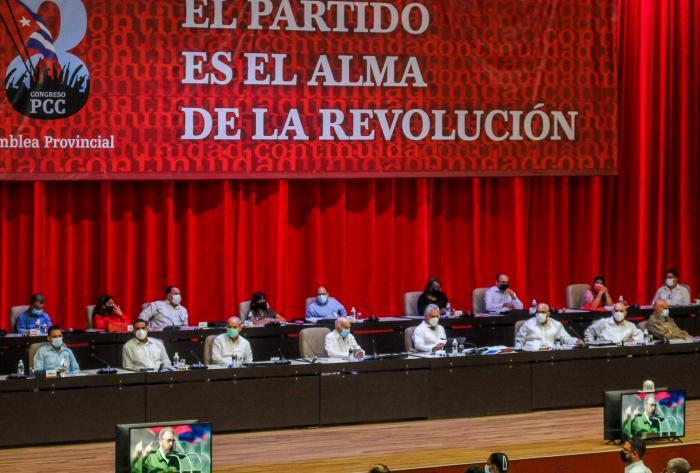
These measures severely limited our sources of income, severely impacted our exports and a series of fundamental economic activities including tourism. They have divided Cuban families in Cuba and abroad; they have caused us enormous difficulties in financial operations and this is why we are obliged to resist under conditions in which we lack inputs for our principal production and service activities, and face food, fuel and medicine shortages.
Much has been said here about social communication, institutional communication, about the need for communication as a pillar of Party and also government work, about the dissatisfaction with communication that still exists, with the way we conduct political communication; but I think that one of the challenges that communication presents is precisely that we must put a face on the blockade, and the faces of the blockade in Cuba are families that, as a result of the blockade’s impact, have suffered the death of a person because a medicine they needed did not arrive in time, or was denied by the United States government; or those who at some point could not receive treatment with a ventilator in an intensive care unit because, quite simply, the United States government never allowed it, or the efforts we were obliged to make - recognized here - so our scientists could create a vaccine of our own, which would give us sovereignty in confronting COVID-19.
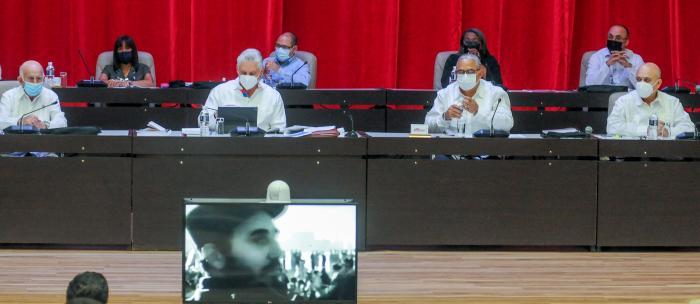
So, although we have accomplished a tremendous feat, although today we are one of the countries with the best results in confronting the pandemic, our vaccines arrived late because we had to investigate, we had to conduct studies, clinical trials, we had to conduct emergency studies to have our vaccines validated to vaccinate the population. But it must be said that, when we began vaccinating, we became the country with the most rapid rate of vaccination and this is why today we are one of the countries to have achieved the highest level of immunity; we have one of the highest percentages of the population vaccinated, boosters included.
But we must put a face to this blockade; we can find this face in the life stories of our families, of our citizens, our people, in the projects that have suffered the serious consequences of the brutal blockade policy.
The other element to consider is the U.S. empire’s aggressiveness toward Cuba. It is hostility that is directed toward the entire world, in order to impose its domination, which we see reflected in a world which, in the midst of a pandemic that has caused more than 6 million deaths, should be moving toward solidarity, should be joining forces to save human lives, all together, but instead is mired in disaggreements resulting from the empire’s policies and today is involved in new wars, in new conflicts, in conflicts that are very dangerous for all of humanity.
This aggressiveness toward Cuba has manifested itself in expressions of unconventional war; they are working with media laboratories to poison Cuba on social networks, to discredit the Cuban Revolution, campaigns that are based on misinformation, lies, double standards and imperial hypocrisy.
Over the last few days, talking with a group of young influencers and youtubers, mainly from Latin America, but also from other parts of the world, who came to participate in the International Colloquium on the occasion of the anniversary of the founding of the newspapee Patria by Martí, I shared the following idea: Fidel always told us that a better world was possible and called on us to fight for that better world. I say that today, given the realities that we are living, for a better world to be possible, as Fidel advocated, we must also improve the virtual world that is a caricature of the real world in which we live. And if you want to verify this, take a look at the case of Cuba. The Cuba that appears on digital networks, the virtual Cuba has nothing to do with the Cuba in which we are living, in which our people are once again starring in a tremendous chapter of honorable creative resistance, as has been recognized by the president of Mexico, López Obrador, and other important figures who do really know our reality.
You have recently seen how, as part of this aggressiveness and media poisoning, they have begun to hypocritically raise issues, displaying their double standards, including the emigration issue, when the party promoting illegal emigration, since the first years of the Revolution, is precisely the United States government. We can see this in our history. The governments of the United States, over all these years of Revolution, have always encouraged illegal departures. U.S. policy, its hypocrisy and double standards, have provoked one migratory crisis after another.
In the same way, with these same distortions, the issues of democracy and human rights are raised whenever they address the situation in our country.
The third element is precisely COVID-19, which has had an impact, flooding the world with uncertainty, and has had consequences for our country, as well.
As I said before, we were denied the possibility of obtaining vaccines, medicines, pulmonary ventilators, and other supplies. The SOS Matanzas, SOS Ciego de Ávila, SOS Holguín, SOS Cuba campaigns were launched hypocritically, when we reached the peak of the Delta variant pandemic, between the months of June, July and August. Nonetheless, we are all aware of the country’s response, working together, with the talent of our scientists, with the understanding and unity of our people. Today I ask myself, when I see everything that has happened in the world and, above all, what has happened with COVID-19 in the United States, who is the one who really needs an SOS?
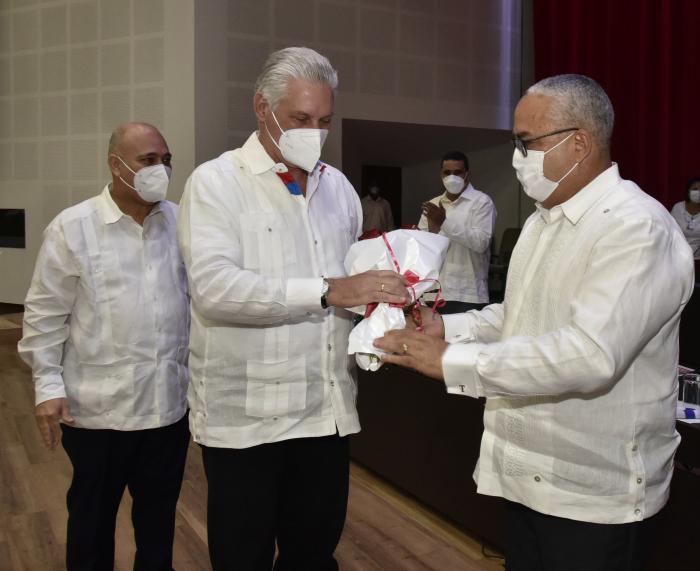
These three interrelated elements, linked, coinciding, converging, have undoubtedly led us to a difficult economic and social situation, in which shortages prevail, mainly of food and medicine.
Now added to our problems are the water supply and drought, inflation, high prices, endless lines, transportation problems, and all of that is causing exhaustion, distress; along with the instability in national electrical service we have experienced, which have caused unnerving power outages; acts of vandalism, counterrevolutionary acts twe have also had to face, and the existence of phenomena that cause a certain level of distribution through channels that deviate from the concepts of social justice our socialist project defends, and all of these are elements which we must face with courage, with wisdom, with intelligence at this time. To do so, we have a political-ideological strategy and we also have an economic-social strategy that was debated and approved at the Eighth Congress of our Party.
In terms of the Political-Ideological Strategy, I want to recall or point out some of the concepts that we addressed during the Congress, to which continuity is being given. The Congress recognized that the Communist Party of Cuba will continue to uphold and defend our essences, which are independence, sovereignty, socialist democracy, peace, economic efficiency, security and the achievement of social justice - this is our socialism.
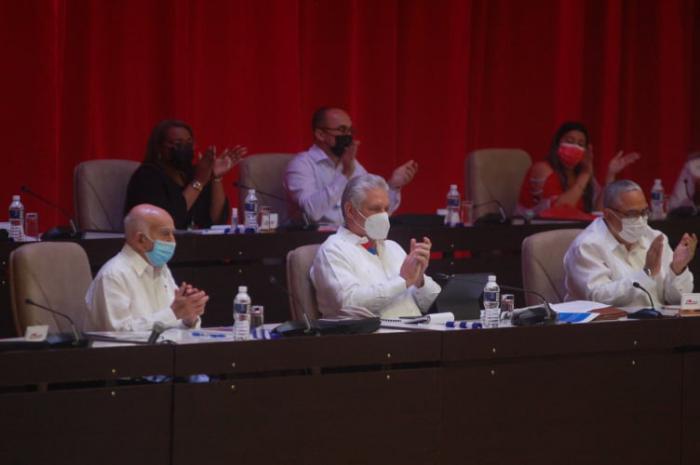
To this we can add the fight for a prosperity that includes everything from food to recreation; that includes scientific development, greater spiritual wealth and well-being; a propserity that empowers the design of the functional and the beautiful. All the elements that have been addressed here are, in some way, included in our Political-Ideological Strategy.
We must recognize that, in the current situation, we face an enormous challenge in the improvement of our society, and to meet this challenge, the Party is looking inward, looking at ourselves, continuing the tradition of criticism within the Party, and to do so, we must also develop the broadest popular participation possible, in all our processes and decision-making
There are issues that we urgently need to address in depth and find solutions, including the formation of values, analyzing the changes that have emerged in our society, the harmonious growth that we need in the non-state sector alongside the state sector, the acceptance of some fallacies promoted by U.S. government political-ideological subversion attempts against Cuba, how to guarantee continuity and how to play a concrete, effective role in all these situations and approaches to the issues facing the membership and local Party organizations.
A comprehensive analysis of each of these issues is required, as the Army General has requested on other occasions, and I remember when he stated: An important obstacle and central problem in the complex process of the most recent transformations in the country has been the lack of comprehensive integration, which has led to improvisation, naive approaches and limited risk perception.
We must assume these demanding challenges and make change, and to do so we must constantly improve ourselves, study every day and analyze the problems in depth.
I believe and I want to share, as I have done in other provinces, that there is are number of elements, without wanting to establish a methodology that limits our view of political-ideological work, or our way of doing politics, but I do believe that it is worth sharing, that we assume and reflect on a group of elements that are rooted in revolutionary practice, that are rooted in our history, which if we approach them in an integrated manner can lead us along this path we are proposing.
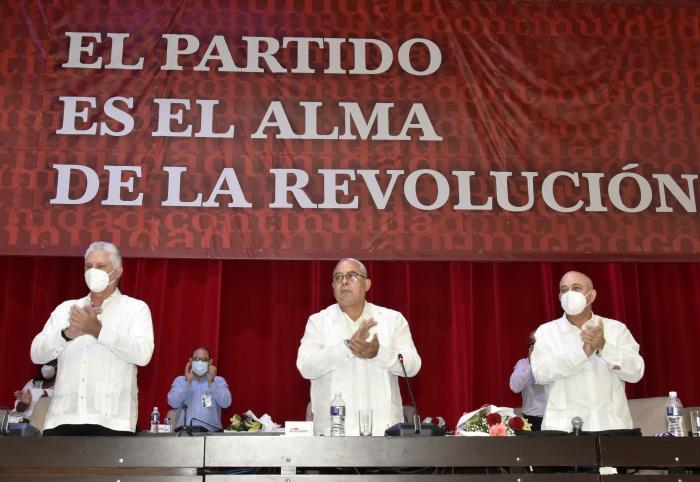
In the first place, take into account the culture of the nation, and I am not referring only to artistic and literary culture, I am referring to culture in its highest expression, in its highest dimension, that is, to our essences, to our roots, to our history, to the elements that define the Cuban nationality, because these are the foundations and within this history lie the answers to our problems, and above all we have a long tradition of struggle and thought, within which coincide, almost exactly, with the nation’s most advanced political and scientific thought, as well as the intellectual thought of the nation.
This began with Father Félix Varela and continued with Luz y Caballero, with the Revolution of 1930, with those who founded the Communist Party of Baliño and Mella, and, of course, it is present in the legacy of Martí and in the legacy of our Comandante en jefe Fidel Castro. Therefore, if we seek a foundation for everything we are doing in this history, if we seek a foundation in the argumentation of Martí's legacy and in Fidel’s legacy, I believe we will also be confronting the challenges we have before us with a greater analytical capacity.
Within this culture is an element that stands out, one that is, moreover, the foundation of our socialism: the struggle for social justice.
Let us also remember what Raúl said to us about this: Socialism means justice and equality, but equality of rights, not income, equality is not egalitarianism, that is, there is a theoretical, patriotic foundation in the ideology of the Revolution.
Also part of this culture is the feeling of vocation, being called to serve the country and the Revolution, a sentiment that has been present in all the generations that have defended independence and sovereignty, and it is precisely from this political culture that the concept of unity emerges and the concept of continuity. We addressed and reaffirmed both concepts during the Party Congress, because this was precisely the convocation made: the Congress of unity and continuity. And for unity and continuity to exist, intertwined with the issues addressed here, the role of youth in the construction of socialism, in Cuba at this time, is extremely important. There is no unity if young people are not present, and their presence must based on the concepts explained by the Secretary of the Party local at the University of Havana: “Youth cannot be viewed with a paternalistic lens, we must be with them and give them the possibility and the space to participate, to believe, to contribute and precislely this way, they advance in their development,” and this was made clear to us by Cuban youth, in our battle against the pandemic.
When we were all focused on how to design strategies to confront the pandemic, when we turned to young people to give them tasks, they were already in the red zone, the young were already in neighborhoods, already in the areas attending to the vulnerable and involved in other tasks. It was young people who organized themselves, with the Union of Young Communists at the forefront, as well as the student and social organizations to which they belonged.
The other element that we most include in the analyses we conduct, to politically secure processes, to develop our political-ideological work, is the ethical foundation of the Revolution, because within our ethics lie the values that have been forged over the course of our history. One of the values that isessential, at this time, is that of anti-imperialism. If you are not anti-imperialist, you cannot understand what is happening in the world and you cannot understand what is happening in Cuba. Only with an anti-imperialist perspective can one understand the perversity, the opportunism and double standards with which the United States has treated Cuba in terms of COVID-19 and the migration issue.
And within this ethic lies something fundamental that Fidel always defended: the truth as a guiding principle of politics. Let us remember the first years of the Revolution, when a huge disinformation and discrediting campaign was directed toward our youth, what did Fidel do? Operation Truth. And what did Fidel always do in difficult moments? Explain, share ideas with the entire people, the circumstances within which the events occurred, an assessment of events and also a call to participate in confronting the difficulties.
Another element is the law, the defense of what is just, which is inseparable from the concept of social justice as the foundation of our socialism, and I believe this defense of what is just, was expressed here, very passionately, by a young jurist who is now the President of the Court in this province, in the capital of Cuba, because by defending what is just, we are defending human dignity.
The first to defend the Constitution and our laws, with our actions and our political understanding are Party members and our local bodies, and we must be the first to continue insisting that our processes be more democratic, that the people’s participation in all our processes be expanded, that political work at the grassroots level of society is also the purview of our Party structures, and all these elements are included in our concept of law.
Let us add to this our policy of solidarity. There is a phrase from Martí that is included in our Constitution: “With all and for the good of all”. This solidarity born in our families, which is the solidarity we have in our neighborhoods, in our communities, the solidarity we have at the national level and is also the solidarity we offer in an exemplary fashion to others in need around the world. This is also the solidarity that is developed with popular participation and serves as the foundation of the happiness and well-being of our people.
In the analyses we conduct, we must also be able to identify the contradictions in our society and determine the causes of the contradictions in society, because we can only, truly solve problems by addressing the causes.
We must do all this with a defense of socialism from a Marxist point of view, to avoid losing our way, especially at a time when neoliberal currents are attempting to impose their criteria and many of these ideas come disguised with a semantic or emotional mantle meant to confuse.
Never in any of the strategies and tactical actions that we promote for participation from the Party can we fail to take into account the revolutionary forces, the role of each individual, their responsibilities, and revolutionary articulation, like that we have built in these times of media aggression on social networks, and the participation of youth as an important revolutionary force, since it is in these battles where young people will see their own strength. And as part of this element of revolutionary forces, as something new, that someone here explained, and which we should continue considering, is the figure of the neighborhood political coordinator, who can resolve an enormous contradiction in the debate we have had for years in the Party, about how to organize our work in neighborhoods, guiding, drafting policies without supplanting the government, without supplanting People's Power, without supplanting the administration, and without supplanting other organizations.
Social communication must support everything we do; it is transversal to all our efforts. If we don't communicate, if we don't argue, if we don't convince, if we don't build consensus, then how can we defend ideas? And to do so, it is very important to project ourselves with content, with arguments, taking into account the heterogeneity that exists in our society, since this heterogeneity means different sectors, it shows us the different audiences, for whom our contents cannot use the same code. Nor can they give the same speeches, although, yes, defending the same essences. And it is important, as demanded here, that revolutionaries and Communist militants be on the front lines of the battle on social networks.
You are aware that, as a component of our political-ideological work, we have been advocating science and innovation, and this is about building the necessary interconnections between the knowledge sector led by our universities and our science, technology and innovation centers with the productive sector of goods and services, which must become more innovative, and with public administration that also must become more innovative. So in what scenario can we promote this interaction? In the development of strategies at the territorial level, in local development projects, strengthening local production systems and also strengthening development from the community, the neighborhood, the municipality, which will impact the province and reach the nation. These relations are also supported by the computerization of society, aspiring now to bring to the process the concept of its digital transformation, and by developing and defending the concept of People's Power in our society, that Fidel designed, which includes popular participation, democracy, control and popular education, and that it has to create three intimately related moments: spaces like the ones we have, which we need to perfect, where our population, our workers and our young people participate to express their opinions, to criticize, propose, mobilize, and create consensus.
A second space is that, after all the popular participation debates are considered, the representatives of our people, who are our delegates to the municipal assemblies of People's Power, and our presidents of People’s Councils take this debate to the Municipal Assembly of People’s Power, and in that that assembly, on behalf of the people, decide what we can do at any given moment, based on the availaibity of resources that exists, and when that comes back approved, as today all the People’s Councils across our country know what budget they have , based on the budget exercise that was conducted this year, and lead the transformation work in their communities, in which the same population that proposed the project is participating.
A third moment is how by proposing, participating and defending projects, popular control is achieved, and popular control must include access to information, transparency, as well as accountability reports from all who lead any at any level of the Party, the government, the administration, and the appropriate counterpart which must be demanding and not complacent when it comes to accountability. If we articulate all these concepts, we will undoubtedly advance in a more united and stronger fashion.
Another issue that we must address in the work of the Party is our growth and, more than growth, the condition of the membership, and to do what we have proposed, we must grow as a Party and as a Young Communist League in all areas, in all scenarios; there are people, there are citizens in our country with the values to join the ranks of the Young Communist League and the ranks of the Communist Party of Cuba. We must strengthen and create grassroots Party branches in all areas of our society.
To continue perfecting the work of the Party, which is one of the mandates the Congress agreed upon, we must answer a series of questions every day, and they are the following:
What can we do to promote the attention of the membership to growth of the Party in all scenarios?
What and how are discussions conducted in our branches?
We must move away from the (old) idea, in our branches we must have the most natural discussions, the most harmonious, addressing the most pressing of all the problems that concern our people and our members, those within the radius of local action and those at the societal level. Branch discussion cannot be a limited, and branches conduct discussions of all issues with the participation of members, and also with the participation of workers and youth who are not necessarily Party members.
How effective are the periodic evaluations we make of members?
How effective are the evaluation and accountability processes we conduct?
What is done every day to achieve more popular participation in our processes?
What is being done to improve the work of mass organizations?
What is the quality of agreements reached in branch discussions?
What is the quality of follow-up on the implementation of what is decided?
And, of course, all of this implies a vision of how, through the Party, we can improve our work.
Confronting political-ideological subversion is also among our priorities, given that these attempts at subversion generate doubts, confusion, which we must address in a timely fashion.
Let us remember that in the last plenum of the Party Central Committee, as a continuation of the Eighth Congress, we approved a National Program for the Study, Research and Dissemination of the Thought, Life and Work of the Comandante en jefe. We approved a program to confront the cultural colonization that they want to impose on us; and we also approved a program of attention to the problems of youth and children, a program that should lead to the implementation, proposal and application of public measures to provide differentiated attention to the problems of young people and children in our society.
Giving political support to the intense legislative exercise underway (is needed) to ensure that, as soon as possible, our society has laws that protect and support the new Constitution approved.
Along with continuing the work in neighborhoods with passion and with the lessons learned about what we are doing, which must also be perfected; and taking into consideration contributions from meetings that must be generalized, with representatives from different sectors of our society. Of course, to do so, our performance as cadres it is important.
I also want to reiterate here ideas that we put forward at the Eighth Party Congress: society and its institutions need cadres with deep ethical and professional training, distinguished by personal qualities like revolutionary nonconformity, sensitivity to the problems of the people, dedication and the ability to face adversity with creativity, cadres who can inspire and motivate innovation.
In all situations, especially the most difficult and challenging, our staff must be distinguished by their dedication to the task, their desire to excel, their modesty and the sensitivity to put themselves in the shoes of others, putting us before me. We have a responsibility to dialogue sincerely, from the heart and be quick about turning perceptions into decision-making. And the work of our branches relating to cadres plays a fundamental role in the performance of our cadres, in the quality of the accountability reports cadres present to our Party structures, and supporting all this with popular control, since the people’s participation also allows us to evaluate the work done in all the projects we lead.
The other fundamental strategy approved at the Congress was the Economic-Social Strategy, which we see articulated as a necessary strategy to confront the international crisis aggravated by COVID-19, based on the National Plan of Economic and Social Development, the Conceptualization of our Economic and Social Model and the Guidelines of the Economic and Social Policy of the country. But what we are most convinced of, in promoting the implementation of the Economic-Social Strategy, is that the current administration of the United States is not capable, nor does it have any political will to change the current situation, in terms of its policy toward Cuba, therefore, the blockade will continue to be tightened and we will continue to face these circumstances and the context that we have outlined.
What is needed here is to develop our creative resistance, which is the capacity of the Cuban people to advance on their own, with their talent, with their effort, with their intelligence, to overcome adversity, and we must overcome what the blockade is attempting to impose, and you may say: that’s idealistic. No, this is not idealism; we are here because of creative resistance and we have defeated the blockade for 60 years; and creative resistance was our response to COVID-19, it is how with talent, with intelligence, we overcame the pandemic.
To advance in the Economic-Social Strategy we must continue to maintain control of the pandemic, which is what has allowed us to open our borders, to begin to revive the economic and social life of the country. The strategy must be a process of constant updating, it cannot be a straitjacket, it must be seen from a certain point of view, with a dialectical approach, always bearing in mind that all solutions to economic problems, that we come up with, must be be socialist solutions, they must be socialist transformations, that allow us to recover social equilibrium, maintain social property as determinant, solutions based on analysis of efficiency, on conservation. Let’s not just talk about supply and demand; to talk about supply and demand we must put forward and construct a theory: production.
Production is what can balance supply and demand, it is what can get us out of the inflationary cycle and get us out of high prices.
We must assume a market with a variety of economic actors, but regulated by the state; strategic and financial planning that is less administrative and bureaucratic, with the necessary balance between political-ideological, economic and administrative mechanisms, promoting productive chains including all economic actors and leaving behind its use as a mere slogan. Everybody here is now talking about productive links and sometimes what they are saying about chaining has nothing to do with the subject. We have already assumed it as a slogan, and what is needed now is to concretize it, as the Varona company has done, as other companies have, truly, creating the real linkages that also give us development.
The full array of economic actors must advance in a structured and unified manner toward the goal of socialist construction; state economic actors, state enterprises, as well as cooperative economic actors and the non-state sector must work together, complementing each other, contributing to and participating in the principal economic and social development programs, in local development projects. And all these economic actors must be articulated with social actors, with political actors and civic actors. Therefore, wherever there is a state enterprise or a small private business, the Party must be there, youth organizations must be there, there must be a union. There are women there who must be supported by the Federation; there the people there who are members of a Committee for the Defense of the Revolution. Do you understand what we are explaining? None of these processes can be seen as separate from the social and political fabric of our country.
In relation to this, we must ask ourselves how to incorporate non-state activities alongside public interests within the construction of socialism; how socialist state enterprises can take leadership in this relationship, in participation, giving attention, involving and inviting non-state actors to work together in the principal programs; how we work with alternatives; how with more agile and attractive measures we manage to oxygenate our economy and the population, under current conditions, especially focused on the supply of food and medicine, improving transportation problems, lowering prices and stabalizing the National Electric System. Thus, we are talking about the need to promote via the Party a superior economic response from all our economic actors, with more national production, with more food production, advancing in producing results and implementing the 63 measures, designed via the exercise of democracy and the participation of agricultural producers; because it was agricultural producers who proposed this entire package of measures and why there is the level of commitment to these measures we now see; and in the same way, defending the 93 measures adopted to promote the sugar industry’s recovery.
We must ask ourselves then: Why are accumulated errors repeated in the economy? Why do distortions of socialism emerge and are established with a certain degree of impunity? How can we promote local production systems, territorial and local development? And, on the other hand, how can we continue promoting needed foreign investment and that of Cubans residing abroad, and how are we advancing in public policies addressing situations of vulnerability and elimination of inequalities, and public policies for youth and children, as I explained earlier.
The socialist state enterprise plays a fundamental role in this Economic-Social Strategy. The future of the country, the future of the construction socialism and the country require successful socialist state enterprises, given the ideological conception we defend and because they bear the greatest responsibility in satisfying the needs of our people. Within socialist state enterprises, we must prepare and project the young, providing development opportunities and the possibility of becoming the central leaders of these companies.
We must think about adequate subordination and structure for each enterprise. We have many national and provincial enterprises, and what is needed in this case are strong municipal enterprises so that municipal autonomy can be developed and so local productive systems and local processes can be developed. We have many “top-heavy” companies, with large administrative management structures, with many people unrelated to production or services earning the highest salaries.
So, what’s going to happen? We are going to resolve everything, so enterprises are profitable, not on the basis of structural analysis, but based on rigorous economic-financial analysis of profitability, and not raising prices. Who is affected by price increases? The population, or the state budget, when we compensate for this with subsidies, to prevent higher prices for the population. And life has already shown us, and we are constantly learning, that what bureaucracy generates are reports, inefficient controls and meetings that cannot be eaten and do not produce anything. So, we are also going to make sure our enterprise structures are organizationally more efficient.
An issue we need to promote in our companies and that must be articulated with other concepts we have discussed here, is that if we need worker participation in anyplace, it is within enterprises. Decisions in a company must take into account workers’ opinions, the participation of workers and, within them, young people. Therefore, those of us in business management must also ask ourselves how to increase the political role played by the workforce as a foundation of the democratic system of participation in the construction of socialism under the conditions of our country.
We need to support enterprise development with the efficiency of our import-export companies, in which contracts play the role they should. Note, for example, that we have just recently discussed the fundamental issue of contracting agricultural production, which has not been done using contracts as legal documents. It has been a conversation between equals, saying: You give me so much and I'm going to help you with this. This cannot work; something so essential, so strategic, must be approached in another way.
Innovation: I insist, innovation must be present on our path todevelopment and the socialist state enterprise must embrace innovation. We must take better advantage of the authorities that have been granted to companies. Automation and computerization processes must be developed in companies.
Agroecology must be developed in agricultural companies as one of the sustainable variants, using environment ally friendly practices to produce food in the conditions we face today, at a time when we do not have financing for fertilizers, for chemical products, and must work on the basis of good agricultural practices and using bioproducts, that contribute to sustainable development.
The socialist state c enterprise must take advantage of the interfaces that have been created between universities and companies, and this province is a pioneer in this effort. The province has, as a quality interface, that of the University of Havana Foundation and the Havana Technological Park at the University of Computer Sciences, and the other interface company at José Antonio Echeverría Technological University, which is shared with the Central University of Las Villas.
It is necessary to continue developing exports, with new exportable items and continuing to recover traditional ones; along with the concept of export poles that has been developed in a number of provinces; the closed cycle in companies, appropriating elements of the circular economy. A country like ours needs to take advantage of everything and not discard anything, everything that is a by-product of production or waste must be utilized. We have seen this very well applied by non-state management at the new economic actors fair. Plus, seeking to provide a greater supply of goods and services to the population, and diversifying production.
A new function which the socialist state enterprise has today, in the conditions of our socialism, is to lead the attention provided and relations with the non-state sector. We ask ourselves: why is there inefficiency, why the inertia and why the stagnation in some state companies? Why are measures not implemented and authorities granted to companies not used? All of this we must support with the strengthening of the Party, with our growth, the internal life and the external life of the Party, in our branches within the enterprise system.
This is about articulating all these elements, it is about articulating all these concepts, it is about articulating emotions and intelligence with revolutionary action, defending and fostering creative resistance without losing revolutionary enthusiasm and optimism, without allowing revolutionary spirits to go soft. And to do so we need to create consciousness, to be able to summon effort and dedication, to grow in the face of selfishness, individualism and pessimism and continue the march with courage, with dignity, with decorum, with high morale, with joy, with confidence and with love for Cuba, so the Party continues to be the soul of the Revolution and the sure guarantee of the unity of Cubans.
Giving our hearts for Cuba, we’re going for more!
All out for May Day!
Socialism or Death!
Homeland or Death!
We will triumph!
(Ovation)
